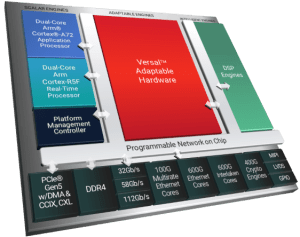Designing with the Versal ACAP: Architecture and Methodology
Course Description
This course helps you to learn about Versal™ ACAP architecture and design methodology.
The emphasis of this course is on:
- Reviewing the architecture of the Versal ACAP
- Describing the different engines available in the Versal architecture and what resources they contain
- Utilizing the hardened blocks available in the Versal architecture
- Using the design tools and methodology provided by Xilinx to create complex systems
- Describing the network on chip (NoC) and AI Engine concepts and their architectures
- Performing system-level simulation and debugging

Level
ACAP 1
Course Duration
3 day
The content in this course may exceed 3 days. Check with your local Authorized Training Provider for specifics or other customizations
Audience
Software and hardware developers, system architects, and anyone who wants to learn about the architecture of the Xilinx Versal ACAP device
Prerequisites
- Comfort with the C/C++ programming language
- Vitis™ IDE software development flow
- Hardware development flow with the Vivado® Design Suite
- Basic knowledge of UltraScale™/UltraScale+™ FPGAs and Zynq® UltraScale+ MPSoC
Software Tools
- Vivado Design Suite 2022.2
- Vitis unified software platform 2022.2
- PetaLinux Tools 2022.2
Hardware
- Architecture: Xilinx Versal ACAPs
- Demo board: Versal ACAP VCK190 Evaluation Platform
Skills Gained
After completing this comprehensive training, you will have the necessary skills to:
- Describe the Versal ACAP architecture at a high level
- Describe the various engines in the Versal ACP device
- Use the various blocks from the Versal architecture to create complex systems
- Perform system-level simulation and debugging
- Identify and apply different design methodologies
Course Outline
Day 1
- Introduction – Talks about the need for Versal devices and gives an overview of the different Versal families. {Lecture}
- Architecture Overview – Provides a high-level overview of the Versal architecture, illustrating the various engines available in the the Versal architecture. {Lecture}
- Design Tool Flow – Maps the various engines in the Versal architecture to the tools required and describes how to target them for final image assembly. {Lecture, Lab}
- Adaptable Engines (PL) Describes the logic resources available in the Adaptable Engine. {Lecture}
- Processing System – Reviews the Cortex™-A72 processor APU and Cortex-R5 processor RPU that form the Scalar Engine. The platform management controller (PMC), processing system manager (PSM), I/O peripherals, and PS-PL interfaces are also covered. {Lecture}
- PMC and Boot and Configuration – Describes the platform management controller, platform loader and manager (PLM) software and boot and configuration. {Lecture, Lab}
- SelectIO Resources – Describes the I/O bank, SelectIO™ interface, and I/O delay features. {Lecture}
- Clocking Architecture – Discusses the clocking architecture, clock buffers, clock routing, clock management functions, and clock de-skew. {Lecture, Lab}
- System Interrupts – Discusses the different system interrupts and interrupt controllers. {Lecture}
Day 2
- Timers, Counters, and RTC – Provides an overview of timers and counters, including the system counter, triple timer counter (TTC), watchdog timer, and real-time clock (RTC). {Lecture}
- Software Build Flow – Provides an overview of the different build flows, such as the do it yourself, Yocto Project, and PetaLinux tool flows. {Lecture, Lab}
- Software Stack – Reviews the Versal ACAP bare-metal, FreeRTOS, and Linux software stack and their components. {Lecture}
- DSP Engine – Describes the DSP58 slice and compares the DSP58 slice with the DSP48 slice. DSP58 modes are also covered in detail. {Lecture}
- AI Engine – Discusses the AI Engine array architecture, terminology, and AIE interfaces. {Lecture}
- NoC Introduction and Concepts – Covers the reasons to use the network on chip, its basic elements, and common terminology. {Lecture, Lab}
- Device Memory – Describes the available memory resources, such as block RAM, UltraRAM, LUTRAM, embedded memory, OCM, and DDR. The integrated memory controllers are also covered. {Lecture}
- Programming Interfaces – Reviews the various programming interfaces in the Versal ACAP. {Lecture}
- Application Partitioning 1 – Covers what application partitioning is and how the mapping of resources based on the models of computation can be performed. {Lecture}
Day 3
- PCI Express & CCIX – Provides an overview of the CCIX PCIe module and describes the PL and CPM PCIe blocks. {Lecture, Lab}
- Serial Transceivers – Describes the transceivers in the Versal ACAP. {Lecture}
- Power and Thermal Solutions – Discusses the power domains in the Versal ACAP as well as power optimization and analysis techniques. Thermal design challenges are also covered. {Lecture}
- Debugging – Covers the Versal ACAP debug interfaces, such as the test access port (TAP), debug access port (DAP) controller, and high-speed debug port (HSDP). {Lecture, Lab}
- Security Features – Describes the security features of the Versal ACAP. {Lecture}
- System Simulation – Explains how to perform system-level simulation in a Versal ACAP design. {Lecture, Lab}
- Board System Design Methodology – Describes PCB, power, clocking, and I/O considerations when designing a system. {Lecture}
▪ System and Solution Planning Methodology – Describes design partitioning, power, and thermal guidelines. Also reviews system debug, verification, and validation planning. {Lecture}
▪ Hardware, IP, and Platform Development Methodology – Describes the different Versal ACAP design flows and covers the platform creation process using the Vivado IP integrator, RTL, HLS, and Vitis environment. {Lecture, Lab}
▪ System Integration and Validation Methodology – Describes different simulation flows as well as timing and power closure techniques. Also explains how to improve system performance. {Lecture}

Date
19 June 2023 - 21 June 2023
Location
Core|Vision
Cereslaan 24
5384 VT
Heesch
Price
€ 0,00
or
30 Xilinx Training Credits
Information
Training brochure
Registration form
Registration on demand, please contact us.
